Wayne C. Allen's Blog, page 37
July 22, 2013
Unpacking Your Mind
Unpacking Your Mind — learning more about how your mind works is key to living your life differently
In This Moment
This is the second last article…
A reminder that we’re now also writing a travel blog called, "Simple Zen Travellers." We’ll share tools and methods for turning your travel into an adventure in self-knowing. You can sign up at:
http://www.simplezenguy.com/travellers/
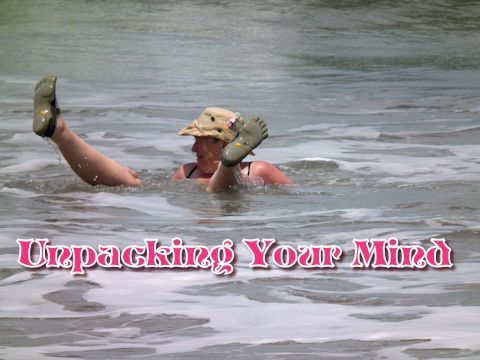
It’s amazing. The more sure you are about the rightness of your thinking, the more stuck you are. The opposite of stuck mind, to Buddhists, is “Beginner’s Mind.”
The mind is a mysterious thing.
When used to explore, analyze, and create, the mind is both efficient and elegant. But where we go astray is in not noticing how our minds actually work.
We tend to take it all for granted. We assume that what we see, and how we interpret what we see:
a) is correct
b) is the same as others see it
c) is the result of our objectivity
In Buddhism, there is the idea of the emptiness of things. I describe this as "Empty of meaning." In other words, the labels we put on things are artificial constructs; are not an innate part of the thing itself.
For example, Mt. Rushmore is quite large.
However, when compared to the Crazy Horse Memorial, it’s quite small. So, is it small, or large? (All four 60-foot high heads on Mt. Rushmore would fit inside just Crazy Horse’s head.)
It depends. On what you compare it to. In other words, Mt. Rushmore does not have, as an innate characteristic, "largeness."
Right and wrong are similar.
The question is, according to whom? The thing being judged does not have an innate characteristic of rightness or wrongness. That’s something we apply to the thing. Like a coat of paint is not innate to what it covers over.
The reason we label is directly related to to workings of our two- hemisphere mind.
Brain scientists have devised lots of experiments to sort this out… to see the process. One set of experiments involves optical illusions. Something appears to be one thing, and under a different "light," we become aware of another thing.
Another way to describe our mind’s functions is to look at the separate halves of the brain. Different functions, and also part of the root cause of our confusion.
Lately, I’ve been enjoying the writing of Steven Pinker — he’s a Psych Professor at MIT and also a Canadian. He is deeply engaged in studying the mechanisms of language and thought, and I wasn’t sure I’d like his stuff. As it turns out, it’s incredibly challenging, but also seems to confirm the idea that most things aren’t as they appear.
Here’s the necessary Biology 101:
As background, the right side of the brain is the creative/visual side. It does not have language per se, but "speaks" in images and actions. You might say it sees and hears but does not label or try to explain.
The left side of the brain does math and processes language. It is also the seat of "labelling" — in its benign form: "The thing I see is an apple (label) and an apple is in the categories, "Fruit, tasty, eatable, round, red." In it’s not so benign form: The object I see is a woman, which fits the categories, "subservient, needing to be controlled by a man, temptress."
Remember, whole groups of fundamentalists believe that last one, considering it both "true," and "god’s will." This is the left brain, running amok.
Here are two ideas, from Pinker’s books. The first comes from The Blank Slate: The Modern Denial of Human Nature: (pg. 43)
There is a connector, the corpus callosum, which allows communication between the right and left hemispheres of the brain. Julian Jaynes wrote about its development in The Origin of Consciousness in the Breakdown of the Bicameral Mind. Some people have this connection severed through surgery or accident. In experimenting with such people, a startling learning emerges.
One experiment goes like this: (Remember, they’re experimenting on people who have no connection between the hemispheres of their brains.)
The researchers flash "WALK" so that only the right brain can see it (by keeping it in the right brain’s visual field). The right brain sees the words, and gets the person up and walking out of the room. The right brain, remember, sees in images and actions, and takes things literally.
Now, here is the interesting part. They then stop the test subject and ask him why he’s leaving the room. The question is picked up and answered by the left brain. (Remember: left brain activity – reasoning, labelling and explanations.) In every case, they hear something like, "I’m getting a coke."
This is very peculiar
Because of the nature of the experiment, the left side of the brain never saw the "WALK" sign. The connection between the hemispheres is severed. So, you’d think the left side would say, "I don’t know," or, "That’s odd. Every time we do this experiment I end up leaving the room, and I don’t know why."
Instead, the left side of the brain "justifies" behaviour it hasn’t a clue about. It invents a reason, and is willing to assert its correctness.
Pinker writes:
"The spooky part is that we have no reason to think that the baloney-generator in the patient’s left hemisphere is behaving any differently from ours as we make sense of the inclinations emanating from the rest of our brains. The conscious mind–the self or soul — is a spin doctor, not the commander in chief." (pg. 43)
"Spin-doctoring" is an apparently automatic process, and explains, for example, why people blame when things don’t go the way they want them to.
It isn’t even necessarily an intentional lie. It’s just the left-brain’s instinctual need to have a reason for everything, no matter how far fetched. It’s also why, when we see others doing this (blaming, being inconsistent, justifying behaviour they just said they were not going to do again) that we judge them to be full of it.
Pinker’s description of the left side of the brain as the "baloney-generator" is quite correct.
Here’s another idea for you.
In his earlier book, How the Mind Works, Pinker Pinker states that learning or behavioural change comes about in a 2-fold process:
we first change the way we think about something (thinking follows certain rules. Changing thinking follows the same rules. We learned to add by rote and by experience. We then took that pattern an applied it to multiplication, while changing the way we handled the numbers.)
then we change what we are doing, by rigourously applying the new understanding.

A new way of seeing
So, changing the way we think and act in the world first of all involves admitting we don’t know something. Or admitting what we are doing isn’t working. We then must fight the influence of the "baloney-generator," which starts coming up with excuses for past behaviour.
It is absolutely predictable that this will happen. Just like in the experiment with the brain patients–they don’t know, but they sure have a reason.
When firing on auto-pilot, nothing can change, because belief and behaviour is a closed, self-sustaining system. We simply believe what our "baloney-generator" is shovelling.
The way out happens as we train ourselves to notice the baloney, and change our behaviour. One way is to state, loudly and clearly:
"Oops. I was just generating some baloney there. I don’t know. Let’s talk about it."
We begin to change when we simply say, "I haven’t got a clue."
If I think I know something, I am paralyzed by what I think I know. If I am open to learning, I have a chance to actually make new brain connections and thus change the way I understand what’s up.
I can’t change my genetics, nor can I change how I was parented. (Notice, BTW, how many people whine about their genetics and parenting, the two things completely out of their control.) I can become a learner, by focussing on Beginner’s Mind.
Even a true Master will acknowledge that he or she is a learner.
There is no, "I’ve got it!" There is only, "I am getting it!"
If I value being right, I will not be open to changing my belief. I will simply want recognition for what I know. If I want to be the centre of attention, I will either be larger than life, or will change my behaviour continually, trying to be all things to all people. If I want ultimate success at work, family and relationships will suffer. If my focus is possessions, I will be consumed with getting.
What is working for you and what is not? What excuses do you list for not changing? And when will you let go of them, and explore other options– as you endlessly show up as a Beginner?
We can shift our lives by exploring our thoughts and changing our behaviours. If we choose. Again and again.
Make Contact!
So, how does this week’s article sit with you? What questions do you have? Go to the top of the page, and click on the article title, and leave a comment or question!
Weekend Residentials
Darbella and I can help you to find a new, vibrant, rich path. Our Weekend Residential program is just you and us — we will work with you, helping you
to become the change you want to see.
Read about it here:
Weekend Residentials
The post Unpacking Your Mind appeared first on The Pathless Path.
July 15, 2013
What we say is irrelevant; what we do is who we are
What we say is irrelevant; what we do is who we are — talking a good show is meaningless.
In This Moment
In Buffalo NY today, on the way to Chicago and points west. Will be at The Haven August 2. Look us up if you are in the vacinity!
A reminder that we’re now also writing a travel blog called, "Simple Zen Travellers." We’ll share tools and methods for turning your travel into an adventure in self-knowing. You can sign up at:
http://www.simplezenguy.com/travellers/
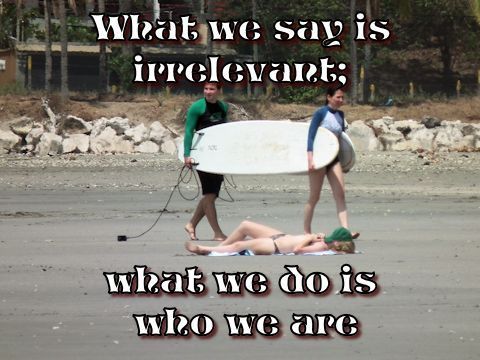
This semi-lighthearted manifesto consists of ideas that “hook” into each other. And one of those ideas is this: “inside” and “outside” are inexorably linked. I would go so far as to say that I understand another “only” based upon their behaviour.
Here are a few examples:
Rosa Parks: I would assume that her internal theatre, back in the 60s, was "Systemic racism is simply wrong — indefensible." Most readers of this blog would agree with this. But here’s the thing. So what?
Her belief is a "warm, fuzzy," and we liberals nod sagely in agreement. Had she only thought her thought, we’d all be going "Rosa who?"
Her thought, however, coupled with her decisive action, changed things, massively.
How? She sat down in the front of a bus, and quietly refused to move. She willingly took the pressure, the beat-down, etc. At that moment, her inside and outside was in harmony.
And still, no external change.
Then, the word got out (imagine this happening in a world without Twitter, etc.) … somehow, and got picked up by the media, and Rosa’s action stimulated the hearts of multitudes of Freedom Riders, who went South and sat down, and in this way, began to break the back of government sponsored racism in the US.
Buddha, Jesus, Muhammad — died with a handful of true followers. Spoke, and spoke, and spoke to thousands, yet the movement came from the nitty-gritty work of the "disciples," who turned the personal, through their actions (and often, martyrdom) into a fire.
On the other hand, I think of how many people I know who go no further than the talking, lecturing, and pronouncing.
Meditators who only meditate when things are going well. Communicators who only use the model in the good times, reverting back to lectures and brow-beating when confronted. People who want an open body (or relationship,) yet who tighten up and shut down at the first hint of intimacy.
Therefore, we’ve gotta ask,
Why are people so willing to talk a good show,
and so reluctant to actually live it?
I won’t spend a lot of time on this, as I talk a lot about how we live out the dramas of our lives. What did occur to me was the "churchly" idea of sins of omission and commission. We’ll drop the sins part (as there really is no such thing) and just look at the variables.
Omissions are the things we choose not to do, even though we know that the omitted behaviour would be in our best interest.
As usual you’ll notice that I’m not talking about the best interest of others. It’s impossible to figure our life out by focussing on the wants and needs of others. Simply put, "the needs of others" is an endless and slippery slope. The problem: where does one draw the line? And how many people qualify as having more important or pressing needs than my own? And what do I do when all of those needs conflict?
Back to omissions
If I know, for example, that behaving and communicating in a certain way means that I am heard and acknowledged, and then, knowing that, if I willfully choose not to communicate or behave in that way, I am "guilty" of omission. It doesn’t matter if I preach or teach elegant communication and behaviour.
If my words don’t match my life behaviours, I am a hypocrite.
Commissions are the things we choose to do, even though we know that the enacted behaviour is not in our best interest.
If I know that a certain behaviour, attitude or way of being consistently gets me lousy results and/or "makes me" feel like crap, and if I continue to engage in that behaviour (even if I only do it irregularly) then I am "guilty" of commission.
No matter how strongly I protest my innocence, ("The debbil made me do it!") or my history ("All the women in my family are like this!") or my clumsiness ("I just slipped. After all, I’m human.") — no matter what I believe others are doing, ("Anyone would have gotten upset under this situation,") I am not innocent.
If I make excuses for my the way I choose to behave, I am a hypocrite.
Now, I get asked, a lot, how to get this once and for all. And I reply, "Forget it! This is a lifetime task. One time and one time and one time. "
When I say, "get it," I mean, "get it this time." It’s actually a good thing that we don’t "get it" once and for all. It’s much easier to simply deal with the next situation, and the next, than wait (and wait, and wait) for just the right moment to fix every aspect of your life.
I guess, for me, the answer is endless consistency. The more carefully I can address my issues, experience by experience, the better I get to know myself, and the more I can appreciate the principle of discipline. I am thus consistently disciplined in my behaviour, while being flexible in my beliefs.
Perhaps the way out is to give up on excuses, confusions and self-doubts.
I know. Big task. But most people I talk with show amazing competencies in several aspects of their lives, and then, for example, suck at interpersonal stuff. The competencies match what is needed in the interpersonal arena, but the excuses, confusions and self-doubts are created and activated in an attempt to stay stuck.
Often, this is because the fear of change outweighs the desire to stop the foolishness. Or, it’s an egoic, "I’ll be damned if I’m going to change if everyone else gets to stay the same" thing.
We get past this sticking place by directly and firmly dealing with the only thing we can deal with – our thinking and behaviours.
As we feel the excuses, confusions and self-doubts arising, there is nothing to do but to notice, and in the noticing, make another choice. It’s not about eliminating the excuses, confusions and self-doubts first, then changing the behaviour. That’s futile.
It’s simply about acknowledging the excuses, confusions and self-doubts, gently letting them go, and then acting in a clear and concise way.
I’m still doing Bodywork for friends. It’s now a space thing. Yesterday, one neat young woman had some shoulder issues, as well as self-described confusions about how to live her life passionately. She’s kind of waiting for things to just work out.
[image error]
I did a lot of work on her shoulders, and then moved to the small of her back, butt, and root chakra / genital area. She stayed present, breathed, opened. At one point I looked at her sacral area. I hadn’t worked there at all.
The skin was bright red. (I’m sad I didn’t have a camera handy.)
I commented, and she said, "It’s really warm." She then mentioned how, this time, she stayed present for the entire Bodywork session — no wool-gathering, shutting down, closing up. And she was then able to feel her passion (for life — located, you guessed it, at the sacrum.)
This is integrity — staying open, feeling, acting, not shutting down or thinking too much. Inside, matching outside. And just being on fire.
This week, ask a few intimate friends about your ability to actually live what your mouth is promoting. Look at your level of frustration. Ask yourself about your omissions and commissions. Then, one time, match deeds to words.
I think you’ll like the result.
Make Contact!
So, how does this week’s article sit with you? What questions do you have? Go to the top of the page, and click on the article title, and leave a comment or question!
Weekend Residentials
Darbella and I can help you to find a new, vibrant, rich path. Our Weekend Residential program is just you and us — we will work with you, helping you
to become the change you want to see.
Read about it here:
Weekend Residentials
The post What we say is irrelevant; what we do is who we are appeared first on The Pathless Path.
July 8, 2013
As Within, So Without
As within, so without. — Thinking and acting need to match. We are aw we think.
In This Moment
Getting very close to our road trip out to BC for the beginning of August. Montana and Alberta on the list, too… cousins to see!
A reminder that we’re now also writing a travel blog called, "Simple Zen Travellers." We’ll share tools and methods for turning your travel into an adventure in self-knowing. You can sign up at:
http://www.simplezenguy.com/travellers/
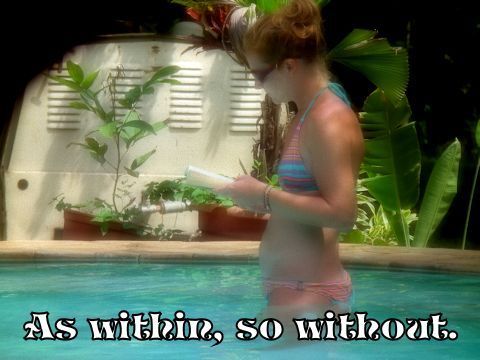
So, this is an old saw, an expression we all know and give lip service to. It is a cousin to the idea that "the world is exactly as you perceive it to be."
One of the first usages of expression was in the famous book by James Allen, As a Man Thinketh.
Allen wrote,
"As a man thinketh in his heart, so is he."
"All that a man achieves and all that he fails to achieve is the direct result of his own thoughts."
James Allen
This idea is a "lift" from the Buddha, who said, "We are shaped by our thoughts; we become what we think. When the mind is pure, joy follows like a shadow that never leaves."
This knowing has to do with all of the levels of our "within."
From a Bodywork perspective, it’s quite the debate as to whether the way we think and then act leads to bodily conditions, or whether the way we carry ourselves leads to the way we act and think. Of course, it’s both.
Often, for example, getting someone to stand in neutral posture, as opposed to curling their shoulders or slouching will result in an immediate change, for the better, in their mood.
Equally as important is the recognition of the power of the way we choose to view our reality and our life stories.

Just stringing myself along…
For many, there is no choice at all. The ego project, that great effort at civilizing us and giving us an additional framework to understand our reality, builds deep-seated beliefs into us. For the majority, the beliefs of "society" are the only beliefs considered. Or, as is the case with a few of my friends, holding anti-society beliefs is the norm. (You say black, I say white. Every time. No choice.)
People saying, "That’s just the way it is," is a good indication of this deeply buried material.
Even more interesting is the ease with which manipulative folk can get the people around them to "buy into" the world-views they have declared to be valid. In other words, as a simple example, victims somehow seem to find people that want to play the game of victimizer. There truly are play-mates for everything… even strange, weird, illegal, and abhorrent things.
It’s when we start to resist the games we’ve formerly played – when we start finding them constricting and overwhelming, that the drama (and the growth) starts.
Now, let’s be clear about this. Many, many people never get to the point of actively challenging their belief systems. Complaining about being stuck, attending seminars and workshops, reading books, none of this is indicative of anything resembling a shifting of perspective.
As in the quote from James Allen, (where outside action matches inside intent) the process requires actually doing something about the places where we are stuck. To say it again, it’s an inside job that turns into a change in external behaviour.
A yoga instructor friend described this the other day: "I used to worry about how my students would see me and my class. Today, I calmed myself, examined my body, and decided upon what kind of practice I needed. I taught that practice, and I was fully present for it. My students really liked the practice, but that isn’t as important to me as being fully into my practice. From there, I am a much more grounded and elegant teacher."
I’m reminded of a quote from Anais Nin, one of my favourite writers and people.

Anais Nin
She went off to France in the 20s to find herself, and one way she did that was to write. One of her routes to finding herself was to write erotic tales, which an anonymous benefactor paid her for. (see Delta of Venus.) He was quite critical of her early writing; he thought it was stilted and not very erotic.
So, Nin made a clever leap. She realized that she could not write about something she hadn’t experienced. Intimately. So, she went out and began to have erotic and sexual experiences. She wrote:
"And the day came when the risk it took to remain
tightly closed in a bud was more painful
than the risk it took to bloom."
Anais Nin
Nin describes an arc of self-knowing that starts where the start belongs.
Imagine the silliness and futility of Nin running around having experiences that fly totally in the face of her internal belief system. If she had made that choice, every action would have set off alarm bells and whistles, and she’d have been so caught in the judgements and the recriminations that her life would have come to a standstill.
Instead, she examined herself, to determine what she was capable of. She discovered and threw out her outmoded beliefs, decided to see what she could learn by being open to new experiences, and began a life-time of actually walking her newly chose path.
As within, so without.
The key to this approach is the commitment to making a choice and seeing it through. Some people just think and never act. Other people "just act," without much thought or commitment. And the guilt starts.
To me, acting and simply observing without pre or post judgement seems the better choice.
I see this with Bodywork. In order to "do" Bodywork really well, you have to commit to showing up and actually doing it, and… and this is important, having the experience that emerges, no matter what it is.
Often, as the process deepens, new material will emerge. It can run the gamut from deep-seated fear and grief to orgasmic passion and feeling. The internal commitment necessary is this: "No matter what comes up, I’m going to experience it fully."
This will require breathing through and suspending judgement. And guess what? It’s an inside job. Because that’s where the game is being played out. It manifests outside in the actual "having" of the experience.
This week, look at your internal theatre and descriptions. Look for sticking points in the story you tell yourself. Notice how those sticking points keep your external reality from being what you want it to be.
Then, go inside and begin to change the internal descriptions. But be pro-active. Not, "I’ll have to think about this for a while." Rather, "Here is what I will think, and here is what I will do."
As within, so without.
Make Contact!
So, how does this week’s article sit with you? What questions do you have? Go to the top of the page, and click on the article title, and leave a comment or question!
Weekend Residentials
Darbella and I can help you to find a new, vibrant, rich path. Our Weekend Residential program is just you and us — we will work with you, helping you
to become the change you want to see.
Read about it here:
Weekend Residentials
The post As Within, So Without appeared first on The Pathless Path.
July 1, 2013
Self-Responsible Relating
Self-Responsible Relating — Your job, even in relationship, is to figure yourself out — not fix your partner. Besides, why are you with someone who is broken?
In This Moment
OK, so we’re making progress! Almost all our stuff is in storage, and we’re narrowing down the dates for our next trips. Even with all our prior trips, still too much crap. The tossing continues!
A reminder that we’re now also writing a travel blog called, "Simple Zen Travellers." We’ll share tools and methods for turning your travel into an adventure in self-knowing. You can sign up at:
http://www.simplezenguy.com/travellers/
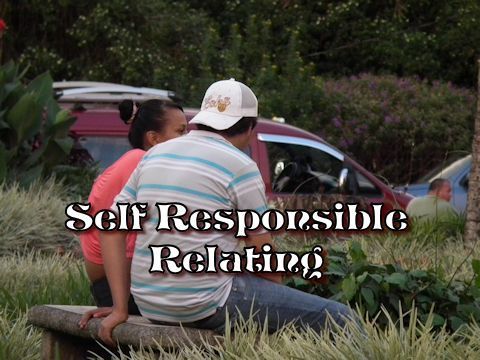
I was into my online reader the other day, and noticed an article.
The author was quite angry about some stuff she’s read — which could be called "woman blaming."
The gist was, she’d seen two articles, and both "suggested" that if a man in a relationship is misbehaving, the woman is doing something wrong… is somehow empowering the "bad" behaviour.
She had two great points:
A woman cannot change a man by being more feminine.
A man cannot change a woman by being more masculine.
And then, this one:
No one can change anyone who doesn’t want to change.
OOPS! If only she’d stopped after "anyone!"
And then, quasi-redemption!
We can’t change other people, we can only help them with the process if they want to change, and if a dude doesn’t want to change there is no force in heaven or earth or between your legs or your ears that will make him do so.
We don’t want to whip through the third bullet point, though. Contained therein is a big problem. When I read, "…change anyone…" what I see is this idea:
"Women are inherently enlightened, and therefore are in relationship to help their partner change, "if the man wants it."
Here’s part of a comment from a reader of the above article:
"I’ve spent years educating myself about the opposite sex and learning Man Training 101, convinced it was all somehow MY fault, but at the end of the day there is only so much that one partner can do if the other one won’t step up. And that goes both ways.
To prove a point, my ex husband is now unemployed and homeless 7 years after we split, living in a van on his mum’s drive. He refuses to help himself even now. I have him a glimpse of the good life but he ruined it. His issues were too ingrained and he refused to even attempt to deal with them and guess what – you can’t do it for them!"
Well, of course you can’t do it for them! The point: it’s not your job. Your job: keep your nose on your side of the fence, and work on your own stuff.
One person, in the comments, (and I know, you’ll be surprised  the lone male voice…) wrote:
the lone male voice…) wrote:
"There’s absolutely nothing a woman can do to fix a bad man (or vice versa for that matter) – they just have to get it in their heads themselves and your only options are to either sit it out and wait for them to grow up or bail."
It begs the question: if you’re so enlightened, what are you doing in a bad relationship? That’s why my back goes up over the sub-plot of the article.
The article writer (a 20-something) mentions that she’s now dating an older man, because they’re either more mature, or easier to spot if they are defective. Same song, different key.
My problem with this is the universality of the comment. The way out, of course, is to only choose to be in relationship with people who are on the same page as you. This has nothing to do with age.
But really, my back goes up a tad when I read the "Man Training 101" kinds of comments. I’d like to suggest that men and women are equally screwed up… the only difference I’ve noticed in all my years of working with people is that women tend to be a bit quicker to go for therapy.
Relationship screwups are a two-person dance
In other words, what’s missing in the article is this:
"Wow! Did I ever miss the warning signs! My partner always exhibited a reluctance to growth, and I just sat there, either demanding change, or "trying to persuade him." I need to admit to myself that I got into the relationship thinking: He’s really not right for me, but I can fix him!"
Of course it’s easier to see the flaws of others. It’s hard work to work on (or even acknowledge) our own flaws.
A relationship is not the place for therapy, or (wo)man fixing. It’s a meeting of equals, for the purpose of mirroring. This means that I hold up a mirror for Darbella to see herself, and vice versa. Not advice or fixing.
Sure, the women in the above article and comments (eventually) saw the light and got out. Good for them. Now, they need to take a moment and fully and deeply acknowledge, "I married him!!!" Not so enlightened, eh?
I say all of this from experience. While Darbella and I have been together since 1983, this is my third marriage. I’ve been through the "I can change her" bit. I got over myself, and found someone I wanted to be with, and who has always appeared, to me, "Wonderful just as she is." I grew up.
I wrote about this in Find Your Perfect Partner. I devised a way to figure out, while dating, whether the person you’re considering is a "fit" for you, or not. In my other books, I’ve provided all kinds of tools designed to keep you focussed on working on yourself, not losing yourself trying to fix another.
So, as to the above article, I of course agree with the writer: It’s not a woman’s fault if her partner is a jerk. Her self-examination point is simply, "How did I sucker myself into this?" And vice versa.
The only job any of us have is endlessly working on ourselves, figuring ourselves out.
Getting into a relationship doesn’t change this, although it’s easy to get into partner blaming as an excuse to escape the heavy lifting of self-examination.
No relationship book (including mine!) will help you fix another person. Your job, in relationship, is to learn how to get yourself under your own control, as you reveal yourself to another.
Simple. And difficult.
Make Contact!
So, how does this week’s article sit with you? What questions do you have? Go to the top of the page, and click on the article title, and leave a comment or question!
Weekend Residentials
Darbella and I can help you to find a new, vibrant, rich path. Our Weekend Residential program is just you and us — we will work with you, helping you
to become the change you want to see.
Read about it here:
Weekend Residentials
The post Self-Responsible Relating appeared first on The Pathless Path.
June 24, 2013
Trance-formations and Transformations
Trance-formations and Transformations — change is possible if you are willing to explore your auto programs
In This Moment
Presently re-doing all our blog sites to reflect our "new reality." Quite the task! I’ll put links here as things get done!
A reminder that we’re now also writing a travel blog called, "Simple Zen Travellers." We’ll share tools and methods for turning your travel into an adventure in self-knowing. You can sign up at:
http://www.simplezenguy.com/travellers/
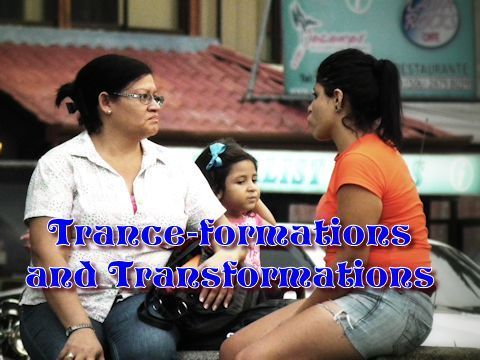
For multiple years back in the 80s and early 90s, I was deeply “into” hypnosis and NLP (Neuro-lingusitic Programing.) I liked the idea of going in and playing, directly, with the mind’s programming.
The grandfather of clinical hypnosis, Milton Erickson, taught and practiced for decades.
Many of his students are still alive, and several have contributed to NLP. NLP, at it’s base, takes Erickson’s flexible approach (it’s said he never repeated an induction or hypnotic pattern) and codified it for easier learning.
Which was all fine and dandy, until car salesmen started learning it.
I remember going in to buy a car once, and the sales guy started pattern matching, and playing other NLP games. He was OK at it, and I even allowed myself to "feel the pull" he was bringing about by his words and actions.
Then, I got bored
So, I started shifting my patterns (the way I was talking, sitting, etc.) away from what I had been doing. He got confused, then compensated. I shifted again. And again. Pretty soon, he stopped talking and looked gob-smacked.
I said, "Enough with the NLP, let’s talk cars." He went a bit rigid, then smiled. "I’ll stop if you will!"
The basis of NLP is that our brains are lazy. Powerful, but lazy. Or economical.

My god, this horse comes with a phone!!
Thinking burns a ton of calories. Uses a ton of oxygen. So, our brains develop patterns, or habits. Example: you want to call a friend, so you pick up a telephone, not a banana. You habitually "know" that phones are for calling. No thinking necessary.
You are actually in a trance state when you reach for a phone. Or drive a car. Or walk down stairs.
The problems come along when more and more things fall into the trance category. The cure, then, for trance-formation is… transformation.
The things you believe to be so are nothing more than trance states. Your brain has been fed a certain line of thought, and it’s "hooked" to something. (Back to phones. The hooks: needing to make a call, and seeking the phone.) Eventually, you see (hear, etc.) the hook, and the belief is triggered.
No thought. Just stimulus / response.
The gross example of this is fundamentalism. Fundamentalists see something that "offends them," and all thought goes out the window. All that you hear and see is mindless action, rhetoric, and often, violence. They spout off about their "religion," but of course "miss" that other believers react differently. They are caught, and in a sense, brainless.
Of course, this process is mostly quite subtle.
One client has an issue with being too comfortable with herself. She receives complements, or is treated well by her partner, and when her "set point" is reached, ("I’m not supposed to feel this good!") she gets critical, or turns off, or does something to reduce the feeling of "good."
The trigger, the hook, is her pleasure set-point.
Another person — a friend — is lifting weights and running, and hasn’t lost any weight, but is more buff. She realizes that the weight thing is her mouth opening too often to stuff in carbs. Her belief is, "I shouldn’t have to work hard, things should just work out." So, she does what she always does with those carbs, and guess what? No weight loss.
Transformation is seeing yourself
Everyone does this stuff differently, but the commonality is that the things you are stuck over are caused by you, refusing to observe your beliefs, accept them, and then change your patterns.
Asking "why" doesn’t help
The why question only leads to story telling and blaming others (or a situation). The short answer to the why question is:
Because that’s what you do… it’s your pattern.
In the case of the client with the mis-set self-esteem, the key is for her to notice the feeling that comes right before she makes a mess for herself. The tight, icky feeling of being "too loved." As she notices, she can stop herself from reacting, and say,
"So, I notice I’m hearing (your complement) and I’m about to reject it, because that’s what I do to make myself miserable. I want to own that, and then shift, breathe, and invite you to complement me again, so I can reset my tolerance point."
She will need to do this repeatedly, for a month or more, with no slip-ups.
Or she can whine about how hard change is (Yup. Hard. If it wasn’t, everyone would have their shit together.)
Transformation takes courage, strength, and determination, because you are fighting with decades of programming — years of trance-formation.
Yet, it all boils down to this, griping and staying stuck, or staying preset while shifting your behaviour.
No one can help you, as this is all about you. Just like everything else in your life.
Make Contact!
So, how does this week’s article sit with you? What questions do you have? Go to the top of the page, and click on the article title, and leave a comment or question!
Weekend Residentials
Darbella and I can help you to find a new, vibrant, rich path. Our Weekend Residential program is just you and us — we will work with you, helping you
to become the change you want to see.
Read about it here:
Weekend Residentials
The post Trance-formations and Transformations appeared first on The Pathless Path.
June 17, 2013
Flexible Frames
Flexible Frames — if we miss our frames of reference, we’re in for a miserable life. If we expect the wolrd to agree with our internal frames, we’re in for a miserable life.
In This Moment
Road trip out West is coming up in July. If you’d like to sponsor a Bodywork workshop, let us know!
A reminder that we’re now also writing a travel blog called, "Simple Zen Travellers." We’ll share tools and methods for turning your travel into an adventure in self-knowing. You can sign up at:
http://www.simplezenguy.com/travellers/
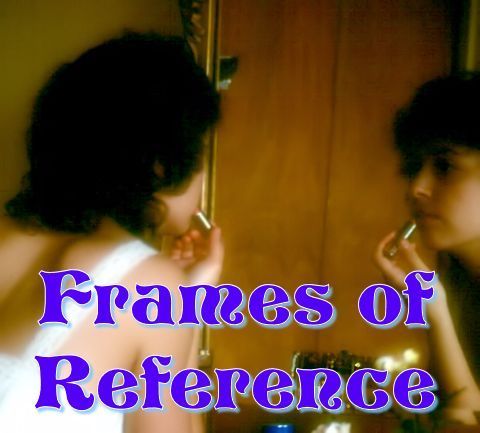
It’s interesting, travelling. Frames. Of Reference. And expectations.
Flexible Frames
I’m writing this in La Fortuna, Costa Rica, one of our favourite towns. It’s nestled at the foot of Volcan Arenal, a now dormant volcano. There are hot springs everywhere.

Last trip, we went to a resort called Baldi, which has 17 or so hot pools of various temperatures. Loved the pools, loved the included buffet lunch.
Last time, a couple of pools were under repair, and the whole place was open to everyone.
This time, other pools were closed, and the top end pools and waterfall were marked VIP access. (Darbella and I went in anyway — we figured they could toss us out…)
And no buffet. Lunch was in one of their restaurants, and was from a menu.
So, frames.
Expectations. Things were not as we remembered them, and not what we expected. My initial reaction was to tighten and annoy myself. For a minute.
Then, (and here is what we think makes sense) we had a breath and adjusted our expectations to reality. As opposed to expecting reality to shift to meet what we expected.
What we did
Breathed. Noted what was closed for repairs, sighed, and went into the open pools. Walked up to the buffet, got turned away and pointed to the restaurant. Had a breath. sighed, went to the restaurant and had the best sea bass ever.
Now, I know. Everyone would have done the same, right?
Not necessarily. As we travel, we meet lots of people that totally lose it when unexpected things happen. Melt down. Shut down. Start making demands. And the demand is this:
You need to change what you are doing so I don’t upset myself!!!!
Not helpful. Because… No. "They." Don’t.
Two other examples. I subscribe to a YouTube channel on massage (among other things – nutrition, etc.) And I subscribe to a yoga site that has a paid video membership. You can also buy individual videos.
On the massage site, you’ll see: back massages with the recipient nude to the waist, and cloth over her butt. Front massages, a little bandeau top is added.
They have comments turned on (something I’d never do…) and in come the complaints, based upon the "complainer’s" frame:
The model is "wrong": too much butt crack, too fat, too thin (same model)
The massage therapist almost touched her…
The model is / isn’t hot
Now, clearly, one frame is "horny teenage boys," who are there for titillation. Another frame is the "body averse." (see also the example below!)
But get this: the videos are great teaching tools. I’ve learned a lot of new Bodywork techniques there.
Yet, that is MY frame of reference too! I’m not right. I just have chosen to watch the videos for new ways to do stuff.
And, sometimes I look at a video and think, "That’s not something I’d do…" or "That’s boring…" So… here it is!!!… I click to another video or site.
Here’s the thing. I wonder why the creators leave comments on. I’ve scrolled several of the video’s comments, and have yet to see a comment I’d judge to be helpful.
For some reason (their frame of reference) the creators seem totally locked into the dumb comments.

Before and after
So much so that the last video, on sciatic work, the model was wearing tights.
The massage therapist spent the first minute saying: "You might notice that [she] is wearing tights. That’s because some of you have made comments about our models being dressed inappropriately. This is a teaching site… etc."
I did leave a comment (;-) ) "Turn off comments! Solves the whole thing!"
On the Yoga site I subscribe to, similarly: a video goes up and is for sale. The people doing the yoga were dressed in spandex shorts and sport tops. Very buff – six packs, etc.

Out popped the "I’m a spiritual yogini" crowd.
Too sexualized! Focussed too much on butts and abs. Too much attention to mountain scenery. Too much music. Too many camera angles.
A few comments: loved the routine, got my heart rate up, etc. — were lost in the drone.
In popped a comment from the director of the series. I think I’m in love. She noted that the series was originally created for tv. That a real production company produced it. And key: "If you look at the sample and offend yourself, a) don’t buy it, and b) go get therapy."
If you don’t like it, don’t buy it!
Don’t expect that, if you whine loud enough, others will change so you aren’t upset.
The pools that are open are the pools that are open. The food on the menu is the food that’s available. The way the book is written, or video is made, is the way it is.
You have 100% freedom to live your life as you choose. But just remember that your frame… your filters, your expectations… are also, 100%, about you. Just because you see things one way, this doesn’t mean others do (or should!) too.
If you are teaching something, teach it!
If you endlessly modify what you do so that others don’t offend themselves, you are, guaranteed, producing pap.
On the other hand, if you want to make a ton of money, then choose to cater to the lowest common denominator. And do it well, without whining.
Just don’t dress your models in tights so that no one gets their shorts in a knot.
Because then the trolls will complain about the colour of the tights!
Make Contact!
So, how does this week’s article sit with you? What questions do you have? Go to the top of the page, and click on the article title, and leave a comment or question!
Weekend Residentials
Darbella and I can help you to find a new, vibrant, rich path. Our Weekend Residential program is just you and us — we will work with you, helping you
to become the change you want to see.
Read about it here:
Weekend Residentials
The post Flexible Frames appeared first on The Pathless Path.
June 10, 2013
Retiring, but never Retiring
Retiring, but never Retiring — an update on our plans — as I retire from face-to-face counselling
In This Moment
5 June turned out to be a significant day. As you’ll read below, I finally made up my mind to to retire. This has been in the offing since Darbella retired in 2011. Below, some thoughts about what’s happening now.
A reminder that we’re now also writing a travel blog called, "Simple Zen Travellers." We’ll share tools and methods for turning your travel into an adventure in self-knowing. You can sign up at:
http://www.simplezenguy.com/travellers/
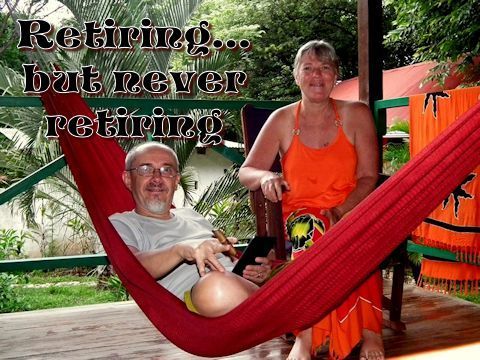
Word Play! I finally decided that travelling and writing was what I want to do now, so yesterday I wrote a brief “retirement letter” to my current clients.
It’s interesting, how decisions have repercussions
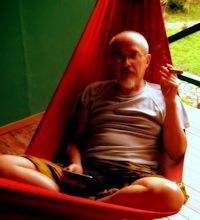
The pose of reflection
Back in 2011, when Dar retired after 31 years of teaching, my line was, "I’m not done." In November of 2011, we did our first long stay in Costa Rica, and thought we’d make a decision about what was next. Instead, we decided to play it by ear.
Back in Canada, we rented a house, and I slid back into counselling, Bodywork, and writing, releasing Find Your Perfect Partner in December of 2012, and The. Best. Relationship. Ever. in February of this year.
At the end of January, Darbella and I moved out of our (rented) house, and house-sat for friends until the end of March. We then left for Costa Rica.
We as always had a blast in Costa Rica.

On the veranda, reflecting
We had the perfect place, in Sarchí, Costa Rica. Our casita overlooked our landlady’s coffee plantation, and the central valley was in the distance. Our little veranda was a comfortable place for drinking a bit of rum, smoking a cigar (me, not Dar,) and talking about life.
After several in depth conversations, I finally was able to say, "I’m done" with face-to-face counselling. And, apparently, done with having a home.
Thanks be for friends!
Our adopted family, the Duttas, seem (so far!  ) willing to put up with us and lend us their guest room. My last sessions with clients will occupy some afternoons in June. But here’s the repercussion part.
) willing to put up with us and lend us their guest room. My last sessions with clients will occupy some afternoons in June. But here’s the repercussion part.
I got up this morning, to write this, and I thought, "What am I going to do with the website?" Or rather, websites?
I need to change the structure, at least, of the main one, to eliminate references to clients and face-to-face counselling. I need to link more directly to the other sites, and to think about promoting my books. and our Zen Life-Flexibility Program.
What shall I write about on this blog… or even, should I keep it going?
I’ve decided that I’ve written enough books about therapy, life and Zen, but what about writing fiction? And, if we’re going to travel, can I still find time to paint? If so, where?
See? Repercussions
What this is really all about is creating a life that has meaning for me, without having the externals… clients, books… as markers for relevance.
I’ve been working since I was 14. I LOVE what I used to do!

The waves of change seem large!
Believe it or not, exiting the Ministry (under a cloud, read This Endless Moment for more) likely is making this transition easier. I’ve never really identified myself by what I do, although being "The Minister!" certainly had its appeal. Having some congregants love me one day and hate me the next certainly was an eye-opener. I learned to let it go.
It’s why I emphasize Zen… the idea of living in this moment, without the "dualities" of titles and external points of reference.
Still, not having a work-focus seems peculiar. Self-indulgent. I’m not sure it’s even allowed

I’m only sort of kidding. Even as my client load has decreased this last year, I noticed I was focussing my attention there. What I do, trumping what I "be."
And now, there is nothing but choice and doing as we choose to do. And as I wrote that, what popped into my head was self-indulgence. Hmm. This might be more interesting than I thought…
Anyway, here’s an outline of the next year
We’re in Kitchener-Waterloo until mid July. Then, a road trip out to western Canada, centering around attending The Haven’s 30th anniversary on the August 2 weekend.
The rest is conjecture
September in Spain, October in Italy, then briefly home (a day or 2.) Our lovely niece Lisa has holidays the first week in November, and wants to hang out with us! So, back to Costa Rica. We’ll likely stay 2 months there, and then one month in Belize.
And then? Yet another evaluation, while hanging out in Canada for a bit.
We can afford to either travel (staying put in a small house when we get somewhere, doing our own cooking, etc.) or put down roots. We even think we might be able to afford a tiny apartment somewhere, and still travel. But we won’t know what works until we do it.
Which is the point of this blog, and the point of our lives.
You only know how things are and how they work by doing them. You can’t think anything through in advance of doing. Planning only goes so far. (Over on our travel blog, we’ll be writing about planning this next trip, but that will be more about the doing of the pre-trip stuff.)
I would like to hear from you all. I can’t decide about this blog. I can certainly keep writing as I have been, minus the input of endless new and amusing clients  I have a small but loyal following — some of you have been reading this since it’s inception as an e-zine in 1999.
I have a small but loyal following — some of you have been reading this since it’s inception as an e-zine in 1999.
On the other hand… who knows?
So, anyway, there’s an update for you. Do let me know what you think!

With love from Wayne and Darbella
Make Contact!
So, how does this week’s article sit with you? What questions do you have? Go to the top of the page, and click on the article title, and leave a comment or question!
Weekend Residentials
Darbella and I can help you to find a new, vibrant, rich path. Our Weekend Residential program is just you and us — we will work with you, helping you
to become the change you want to see.
Read about it here:
Weekend Residentials
The post Retiring, but never Retiring appeared first on The Pathless Path.



